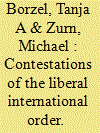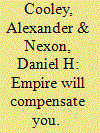| Srl | Item |
| 1 |
ID:
178552


|
|
|
|
|
| Summary/Abstract |
The 1990s saw a systemic shift from the liberal post–World War II international order of liberal multilateralism (LIO I) to a post–Cold War international order of postnational liberalism (LIO II). LIO II has not been only rule-based but has openly pursued a liberal social purpose with a significant amount of authority beyond the nation-state. While postnational liberal institutions helped increase overall well-being globally, they were criticized for using double standards and institutionalizing state inequality. We argue that these institutional features of the postnational LIO II led to legitimation problems, which explain both the current wave of contestations and the strategies chosen by different contestants. We develop our argument first by mapping the growing liberal intrusiveness of international institutions. Second, we demonstrate the increased level and variety of contestations in international security and international refugee law. We show that increased liberal intrusiveness has led to a variety of contestation strategies, the choice of which is affected by the preference of a contestant regarding postnational liberalism and its power within the contested institution.
|
|
|
|
|
|
|
|
|
|
|
|
|
|
|
|
| 2 |
ID:
126321


|
|
|
|
|
| Publication |
2013.
|
| Summary/Abstract |
Many commentators refer to the U.S. overseas network of military installations as an "empire," yet very few have examined the theoretical and practical significance of such an analogy. This article explores the similarities and differences between the basing network and imperial systems. We argue that American basing practices and relations combine elements of liberal multilateralism with "neo-imperial" hegemony. Much, but far from all, of the network shares with ideal-typical empires a hub-and-spoke system of unequal relations among the United States and its base-host country "peripheries." But Washington rarely exercises rule over host-country leaders and their constituents. Historical examples suggest that this combination of imperial and non-imperial elements has rendered the United States vulnerable to political cross-pressures, intermediary exits, and periodic bargaining failures when dealing with overseas base hosts. Moreover, globalizing processes, especially increasing information flows and the transnational networking of anti-base movements, further erode U.S. capacity to maintain multivocal legitimation strategies and keep the terms of its individual basing bargains isolated from one another. Case studies of the rapid contestation of the terms of the U.S. basing presence in post-Soviet Central Asia and post-2003 Iraq illustrate some of these dynamics.
|
|
|
|
|
|
|
|
|
|
|
|
|
|
|
|